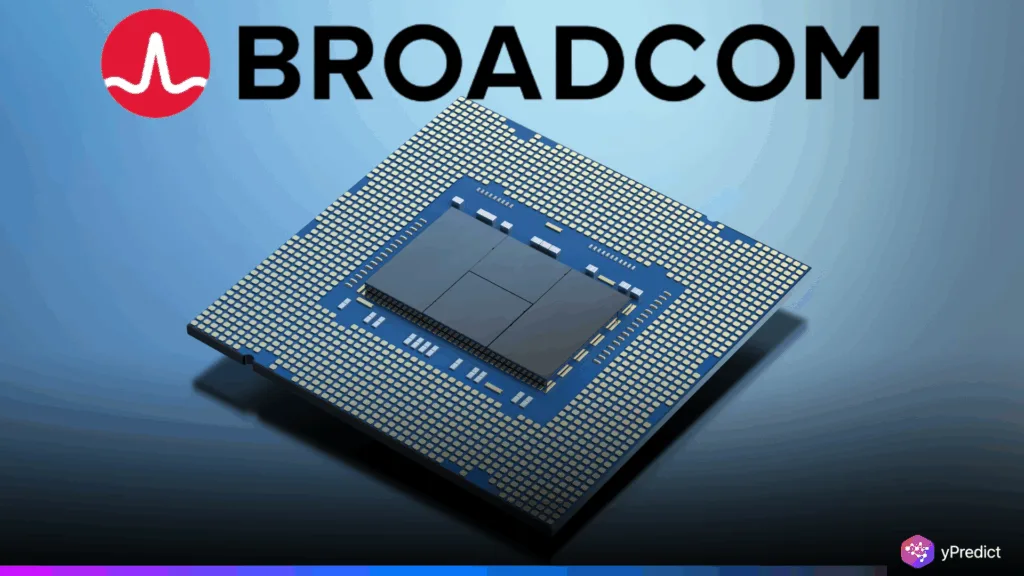
Broadcom is making it known that it will be a compelling player in the AI semiconductor market. The company also reported a 63% year-over-year growth in AI chip revenue. Its last earnings hit $5.2 billion, placing it second only to NVIDIA in AI chips. Broadcom expects $6.2 billion in AI chip sales next quarter, with momentum still rising.
Broadcom, in particular, unveiled a $10 billion AI chip order from a major customer — widely assumed to be OpenAI. This order will ramp over several years. It will drive meaningful AI-based revenue growth for fiscal 2026. The market cheered. Broadcom’s shares surged as much as 9%, hitting all-time highs as investors looked at its potential to steal a march against NVIDIA.
Broadcom’s AI Strategy vs NVIDIA’s Dominance
For the past few years, the AI chip market has been dominated by NVIDIA and its GPUs powering models like ChatGPT and other scale monsters. Yet Broadcom’s custom XPU approach — with custom-designed chips for different workloads — is catching on. CEO Hock Tan highlighted that customers are feeling increasingly comfortable moving internal compute capabilities onto custom-built Broadcom chips, controllers and spectrum switches. This slowly edges away from the need for NVIDIA gear.
Morgan Stanley analysts forecast that custom AI silicon—currently 11% of the market—could rise to 15% by 2030. This suggests there is room for multiple winners. For investors wondering if Broadcom is the “next NVIDIA,” the firm’s AI momentum is a powerful example that the leaderboard is evolving.
Broadcom’s Earnings Reflect AI-Led Surge
Broadcom’s total revenue rose 22% to almost $16 billion in the third quarter. While its earnings per share soared 36%, to $1.69. And its A.I. division — where that $5.2 billion comes from — was unequivocally the star growth engine. Analysts have lifted price targets into the rafters on the $10 billion AI order and the stock is still trading at a premium multiple.
The decision of CEO Hock Tan to extend his own tenure through at least 2030 also adds confidence among investors about Broadcom’s long-term AI roadmap. With a market cap over $1.5 trillion now, Broadcom may soon compete with NVIDIA in terms of investor sentiment. This is, even if its chips are heavily custom and private label.
Implications for AI Ecosystem and Investors
Broadcom’s ascent is an indication of a maturing AI chip ecosystem. Key AI players – among them OpenAI, Meta, Amazon and Google – are betting on proprietary silicon designs. These will offer better performance as well as lower costs. This transition mirrors an industry-wide trend towards vertical integration in compute infrastructure.
For NVIDIA, this involves innovating beyond GPU-centric architectures as well to compete on the axes of flexibility and customizability. For investors, however, Broadcom is a more interesting counter to NVIDIA, providing growth based on customized AI infrastructure and less around shipping widgets.
This evolution also puts pressure on AMD. Its stock plummeted as investor attention swiveled to Broadcom’s breakout performance.
To Wrap Up
Broadcom’s transformation into an AI chip leader powered by 63% YoY growth, a $6.2 billion Q4 forecast, and a $10 billion macro (presumably from OpenAI), marks a major shift in the semiconductor market. Although NVIDIA still has the overall upper hand, the rise of Broadcom demonstrates that GPU-powered AI chips are no longer the only game in town. For investors and industry observers, Broadcom is no longer just “another chipmaker”. It’s a significant player in determining the future of AI hardware.






